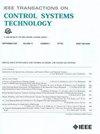PMSM Speed Ripple Suppression Due to Current Measurement Error Using Quasi-Fractional Resonant-Normalized Extended State Observer
IF 3.9
2区 计算机科学
Q1 AUTOMATION & CONTROL SYSTEMS
引用次数: 0
Abstract
Current measurement error causes periodic speed ripple in permanent-magnet synchronous motor control systems. The typical normalized extended state observer (NESO) can estimate and compensate for the load disturbance but is not sufficiently capable to deal with the periodic disturbances. Thus, a speed controller based on the NESO frame, combining a PD controller and a quasi-fractional-resonant (QFR) controller, is proposed to address this speed ripple issue due to the current measurement error including offset error and scaling error. Then, it is verified that the proposed controller satisfies the separation principle and QFR controller does not affect the open-loop characteristics of the system through mathematical derivation in the frequency domain. Besides, the proposed controller in outer speed loop and a PI controller in inner current loop are designed with the proposed analytical parameters’ tuning methods based on frequency-domain analysis. Compared with the existing adaptive proportional-integral–resonant (PIR) controller, the proposed controller not only suppresses the speed ripple to a lower level but also achieves better speed tracking and load disturbance rejection performances. The experimental result comparison confirms the effectiveness of the proposed controller and design scheme.准分数阶谐振归一化扩展状态观测器抑制电流测量误差引起的PMSM速度纹波
在永磁同步电机控制系统中,电流测量误差会引起周期性转速脉动。典型的归一化扩展状态观测器(NESO)可以估计和补偿负载扰动,但对周期性扰动的处理能力不足。因此,提出了一种基于NESO框架的速度控制器,结合PD控制器和准分数谐振(QFR)控制器,以解决由于当前测量误差(包括偏移误差和缩放误差)引起的速度纹波问题。然后,通过频域的数学推导,验证了所提出的控制器满足分离原理,QFR控制器不影响系统的开环特性。此外,利用所提出的基于频域分析的解析参数整定方法,设计了转速环外控制器和电流环内PI控制器。与现有的自适应比例积分谐振(PIR)控制器相比,该控制器不仅将速度纹波抑制到较低的水平,而且具有更好的速度跟踪和抗负载干扰性能。实验结果对比验证了所提控制器和设计方案的有效性。
本文章由计算机程序翻译,如有差异,请以英文原文为准。
求助全文
约1分钟内获得全文
求助全文
来源期刊

IEEE Transactions on Control Systems Technology
工程技术-工程:电子与电气
CiteScore
10.70
自引率
2.10%
发文量
218
审稿时长
6.7 months
期刊介绍:
The IEEE Transactions on Control Systems Technology publishes high quality technical papers on technological advances in control engineering. The word technology is from the Greek technologia. The modern meaning is a scientific method to achieve a practical purpose. Control Systems Technology includes all aspects of control engineering needed to implement practical control systems, from analysis and design, through simulation and hardware. A primary purpose of the IEEE Transactions on Control Systems Technology is to have an archival publication which will bridge the gap between theory and practice. Papers are published in the IEEE Transactions on Control System Technology which disclose significant new knowledge, exploratory developments, or practical applications in all aspects of technology needed to implement control systems, from analysis and design through simulation, and hardware.
 求助内容:
求助内容: 应助结果提醒方式:
应助结果提醒方式:


